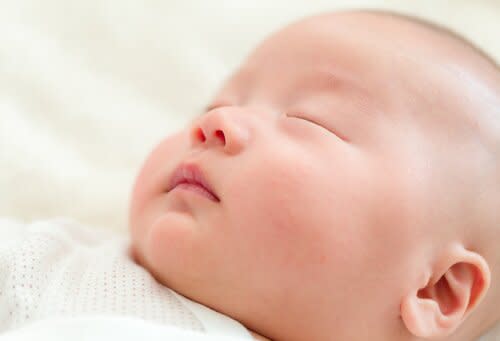Could a Solution to SIDS Be as Simple as a Hearing Test?

Of all the things new parents worry about, sudden infant death syndrome (SIDS) is most certainly near the top of the list. As the name suggests, these deaths seems to strike without warning: Each year, some 4,000 otherwise healthy-seeming babies go down for a snooze, but unbeknownst to their moms and dads, have trouble breathing, suffocate, and die. It's as random as a freak accident -- or is it?
That's the question Dr. Daniel Rubens, an anesthesiologist at Seattle Children's and founder of the SIDS Research Guild, has been grappling with for the last 11 years -- and he believes he may be closing in on the reason behind this tragic medical mystery. He told the Seattle Times that the answer may come down to an inner-ear dysfunction that fails to send a message to a baby having trouble breathing that he needs to switch positions. When that warning goes unheeded, the child simply stops breathing.
Related: How to Prevent SIDS
More research is needed, but one possible solution is to give newborns a hearing test within 48 hours of birth to detect the dysfunction that could put them at risk for SIDS. Babies with the dysfunction would be advised to undergo a complete clinical exam within the first month of life.
Dr. Rubens' hypothesis isn't a total shot in the dark: It's rooted in a study on infant hearing from the Rhode Island Department of Health, which found that the 31 babies in the test group who died from SIDS all had difficulty hearing three different sound frequencies in their right ear. (Four had inner ear damage and bleeding.) Meanwhile, infants who didn't have the hearing issues survived. Rubens duplicated those conditions in lab mice and reached the same conclusion. "The more I look at this, I see it's correct and we need to see this through," he said.
If Dr. Rubens' thinking is correct, it would mean something as simple as a hearing test could help save thousands of lives every year -- and give new parents one less thing to worry about. In the meantime, you can help reduce your baby's risk of SIDS by placing him to sleep on his back in a bare crib (read: no pillows, blankets, or bumpers), avoiding bed-sharing, and keeping your baby away from cigarette smoke.
Plus: Sign up for our Parents Daily Baby newsletter to learn more about your baby's health and development.
Bonnie Gibbs Vengrow is a New York City-based writer and editor who traded in her Blackberry and Metro card for playdates and PB&J sandwiches—and the once-in-a-lifetime chance to watch her feisty, funny son grow up. Follow her on Twitter, Pinterest, and Google+.
Image of Asian sleeping baby courtesy of Shutterstock
